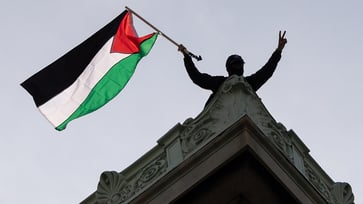The Justice Department has put a stop to the DEA's random searches of airport travelers following a report that raised "serious concerns."
An airline employee received tens of thousands of dollars from the DEA in exchange for providing information on last-minute ticket bookings, according to an inspector general's report.

The practice of randomly searching travelers at airports and other transit hubs by the Drug Enforcement Administration is no longer allowed, as a report from the Justice Department raised "serious concerns" about the practice.
A report released by Justice Department Inspector General Michael Horowitz revealed that DEA agents may have targeted minorities illegally and paid an airline employee tens of thousands of dollars to suggest targets for searches.
The DEA was instructed to halt random searches on Nov. 12 following the review of a memo by the deputy attorney general.

In July, a nonprofit civil rights law firm, the Institute for Justice, released a video of a traveler's experience that went viral.
David C., identified as the traveler, refuses to allow a federal agent to search his backpack.
"In the recorded video from earlier this year, the agent responds, "You don't have to consent." When David reiterates that he doesn't consent, the other man replies, "I don't care about your consent stuff.""
As the agent removed his backpack from the plane, David continued filming. The agent asserted that the dog had detected the bag. Despite David's initial refusal to allow the search, he eventually relented. However, the agent failed to find any illegal items in the backpack. By the time the ordeal ended, David had missed his flight to New York.
The agent stated in the video that David was selected because he bought a last-minute ticket.
"The agent stated, "If it weren't legal, we wouldn't be doing it across the country and it would be shut down.""
An investigation revealed that the DEA had been paying an airline employee a percentage of seized cash for several years in exchange for information about passengers who purchased tickets to certain cities within 48 hours of travel.
The OIG discovered that the airline employee received tens of thousands of dollars in kickbacks from the DEA over several years.
The OIG report states that the DEA rarely documents traveler searches unless there is a seizure or arrest.
IJ Senior Attorney Dan Alban stated in a report that the OIG's findings confirm the predatory DEA practices at airports that they have been saying for years.
Over the past decade, DEA agents at 15 major airports confiscated over $209 million from travelers, with most of the money being distributed to local police departments, according to a 2016 USA Today investigation.
Brian Moore, a musician, had $8,500 seized at Hartsfield-Jackson Atlanta International Airport. Despite never being charged with a crime, he got his money back after a yearlong legal battle that cost him $15,000, nearly double the amount the DEA took.
"Moore stated that it was the worst experience of his life, and it was terrible. He added that it was like they had ruined his entire music career in just a few minutes on that one day."

The DEA and TSA are being sued by IJ for their airport seizure and forfeiture practices, which IJ argues are unconstitutional due to the profit incentive that drives them. IJ is also advocating for legislation to put an end to this practice.
Alban continued, "We welcome the DOJ's suspension of the program as a first step, but policy directives can be altered at any time under this or future administrations."
The Justice Department memo suspends consensual encounters at mass transportation facilities unless they are linked to an ongoing investigation or approved by the DEA Administrator due to exigent circumstances.
Horowitz wrote that the DEA's failure to collect data for consensual encounters and its inability to provide an assessment of the effectiveness of interdiction efforts raise questions about the effectiveness of these activities and leave the DEA unable to provide answers.
The report recommends the DEA to reconsider whether buying a last-minute plane ticket is indicative of criminal behavior and whether agents' practice of questioning passengers before boarding a flight could be perceived as coercive.

The report was not immediately commented on by the DEA.
The OIG pointed out that DEA agents are not mandated to wear body cameras, which makes David C's recording of the interaction a crucial piece of evidence.
Although David initially refused to let the agent search his bag, which caused a delay, he was one of five passengers flagged for search that day, according to the report.
The report states that none of the travelers had a criminal history or any other reason to suggest they were involved in illegal activities.
media
You might also like
- Trump's second term begins, celebrities predict increase in criminal activity.
- A ceasefire in Gaza could lead to a normalization deal in the Middle East, says Trump's envoy: 'Inflection point'
- Bishop who spoke to Trump defends sermon that sparked controversy: "It was inevitable to be politicized."
- Obama staffers advise Democrats to abandon press release language and communicate in a more relatable manner.
- Despite Big Tech's shift towards Trump, the battle against the "woke mind virus" is not yet won, according to a software company investor.



















